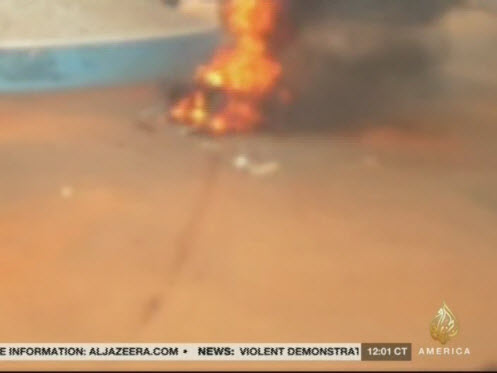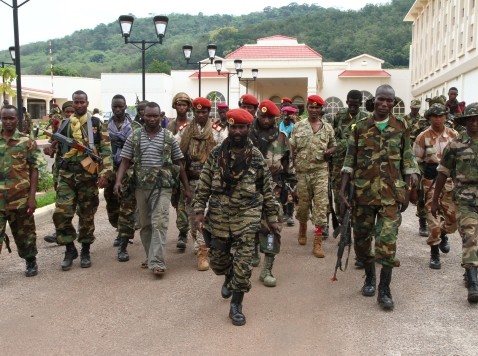
This morning’s key headlines from GenerationalDynamics.com
- Mob rule in Central African Republic as Christians crave revenge
- Egypt ponders the 98.1% ‘yes’ vote on new constitution referendum
Mob rule in Central African Republic as Christians crave revenge

Body burning, after being hacked to pieces on Sunday morning (Al-Jazeera)#
On Sunday morning, a Christian mob in Bangui, the capital city ofCentral African Republic, lynched two Muslims, hacked them to pieces,and then burned their bodies in an act of rage. Scenes of this sortare being reported across CAR, but this one was different becausethere’s a video of the act that’s so horrifying that it’s drawingworldwide attention. One Christian interviewed by the BBC says thathis brother was killed last year by a Muslim, and now says, “If I seea Muslim go past, I will kill them myself.”
Muslim Seleka militias began killing Christians last year, after acoup by Muslim leader Michel Djotodia. There were predictions lastyear of revenge by Christians. The international communityforced Djotodia to step down earlier this month, in the hopethat his doing so would quiesce the Christians, but that hopewas in vain.
As I’ve been saying for several weeks, this is spiraling into afull-scale generational crisis war, despite increasingly desperateinternational efforts to prevent it. As I’ve explained several time,CAR’s last generational crisis war was the 1928-1931 Kongo-WaraRebellion (“War of the Hoe Handle”), which was a very long time ago,putting CAR deep into a generational Crisis era, where a newcrisis war is increasingly likely.
The Kongo-Wara rebellion was nominally an uprising against the Frenchcolonialists, but it also had it share of the same kind of tribalviolence that we are seeing today. After a crisis war like that ends,the survivors on both sides look back in horror at the acts that wereperpetrated on both sides, and vow to devote the rest of their livesto making sure that nothing like that happens to their children orgrandchildren. They succeed at that, but once the survivors havepassed away, so that there’s no one left with a personal memory of thelast crisis war, then there’s nothing to stop a new crisis war fromstarting, and that’s what’s happening now. United Nations and AfricanUnion peacekeepers will try desperately to put a lid on it, butnothing will stop it now.
In fact, young people in CAR today certainly have heard of theKongo-Wara war, just as Americans have heard of WW II. But what dothey know? Nobody’s told them about the its horrors. What theMuslims know is that their great-grandfathers were war heroes becausethey killed thousands of French and Christians, while the Christianshave heard that their great-grandfathers were even bigger heroes,because they slaughtered even more Muslims.
A BBC reporter made an interesting comment several days ago on the warin Central African Republic. He said that in the last few days thewar has gotten worse, because it was now neighbor versus neighbor,rather than militia versus militia, as it had been previously. Thisis a characteristic of a generational crisis civil war, that peoplewho lived together for decades as neighbors in peace and harmony, andeven intermarried, suddenly burst into violence against each other.This is what happened in Rwanda in 1994 and in Bosnia in 1995.
This also provides some insight into what’s happening in Syria. Ihaven’t seen any reports of “neighbor versus neighbor” fighting, whichwould be characteristic of a crisis war. It’s all been “militiaversus militia” and “army versus civilians,” which is characteristicof a non-crisis war that would end, if, for example, Russia stoppedproviding an unlimited supply of weapons to genocidal monsterpresident Bashar al-Assad, who rains barrel bombs on innocentcivilians every day, killing thousands of them every week withcomplete impunity.
Militia versus militia wars can go indefinitely, and indeed many ofthem do go on for decades, with violence alternating with peaceagreements that turn out to be temporary.
But neighbor versus neighbor wars can’t go on forever, becauseeventually you run out of neighbors. These are the crisis wars thatreach an explosive genocidal climax, and then there’s a peace throughexhaustion. That’s what’s coming in Central African Republic, butwe’re a long way from that climax. BBC and Reuters
Egypt ponders the 98.1% ‘yes’ vote on new constitution referendum
There are no charges of election fraud in the 98.1% “yes” vote in thereferendum over Egypt’s new proposed constitution, but there’s a lotof soul-searching going on as to where the country goes next, and alot of questions about the next moves of army chief Abdel al-Fattahal-Sisi. ( “19-Jan-14 World View — Egypt’s constitution approved by 98.1% of referendum voters”)
Put simply, the turnout high “yes” vote, combined with the low turnout– less than 39% of registered voters — seem to indicate that a lotof people decided to vote “no” by not voting at all. Some are evencalling the 98.1% victory “alarming,” because it reflects the climateof intimidation that prevailed, targeting anyone who opposed the newconstitution, forcing them to stay at home rather than to vote at all.There are several groups that are known to have boycotted or partiallyboycotted the vote:
- Members of the Muslim Brotherhood, which has been declared a terrorist group since the July 3 ouster of its leader, Mohamed Morsi, as president almost universally boycotted the election.
- The Salafist party al-Nour is even more religiously conservative the Muslim Brotherhood, and therefore is as opposed to an MB dictatorship as anyone else is. They sided with al-Sisi and the pro-constitution forces, but appeared to have failed to rally their supporters for a “yes” vote.
- The secular and liberal youth movements at the forefront of the original anti-Hosni Mubarak protests. They approved of Morsi’s ouster, and they approved when the Muslim Brotherhood was declared a terrorist organization, but they were outraged when the military-backed authorities passed a law in November banning unauthorized demonstrations.
According to one youth activist:
“For us it is ironic that the constitution talks offreedom of speech and yet those who said no to the constitutionhave been jailed. For many this is a reminder of the previousMubarak era regime.”
Al-Sisi, who says that he will run for president only if there’s apopular mandate, is wildly popular among those opposed to Morsi, butis reviled by Morsi followers. It turns out that the 98.1% “yes” votedoes not mean that Egypt is a unified country. Combined with the 39%turnout, it means that Egypt is more angry and divided than ever.Daily News Egypt and Al-Ahram (Cairo) and AFP
Permanent web link to this article
Receive daily World View columns by e-mail

COMMENTS
Please let us know if you're having issues with commenting.